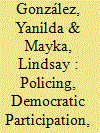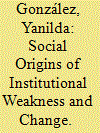|
|
|
Sort Order |
|
|
|
Items / Page
|
|
|
|
|
|
|
| Srl | Item |
| 1 |
ID:
189134


|
|
|
|
|
| Summary/Abstract |
Can democratic participation reduce inequalities in citizenship produced by policing? We argue that citizen participation in policing produces a paradox, which we call asymmetric citizenship. For some citizens, expanding participation in policing expands citizenship by enhancing state responsiveness to demands. Yet citizen participation in policing often produces demands to repress marginalized groups, thereby contracting their citizenship rights. We theorize that formal spaces for citizen participation in policing produce asymmetric citizenship through three mechanisms: (1) defining some groups as “virtuous citizens” and labeling marginalized groups as “security threats,” (2) gatekeeping to amplify the voice of “virtuous citizens” while silencing marginalized groups, and (3) articulating demands for police repression of marginalized groups to protect the rights of “virtuous citizens.” We illustrate the framework through a qualitative analysis of São Paulo’s Community Security Councils. Our analysis elucidates mechanisms through which democratic participation can reproduce, rather than ameliorate, inequality in policing.
|
|
|
|
|
|
|
|
|
|
|
|
|
|
|
|
| 2 |
ID:
165594


|
|
|
|
|
| Summary/Abstract |
Despite historic increases in crime and violence, Latin America’s police forces are characterized by long periods of institutional weakness punctuated by rare, sweeping reforms. To understand these patterns of institutional continuity and change, the author applies the concept of structural power, demonstrating how police leverage their control of coercion to constrain the policy options available to politicians. Within this constrained policy space, politicians choosing between continuity and reform assess societal preferences for police reform and patterns of political competition. Under fragmented societal preferences, irrespective of political competition, reform brings little electoral gain and risks alienating a powerful bureaucracy. Preference fragmentation thus favors the persistence of institutional weakness. When societal preferences converge and a robust political opposition threatens incumbents, politicians face an electoral counterweight to the structural power of police, making reform likely. Using evidence from periods of continuity and reform in Argentina, Brazil, and Colombia, the author traces both outcomes to shifts in societal preferences and political opposition. Despite the imperative to address citizens’ demands by building state capacity in security provision, these cases show that police reform is often rendered electorally disadvantageous.
|
|
|
|
|
|
|
|
|
|
|
|
|
|
|
|
|
|
|
|
|